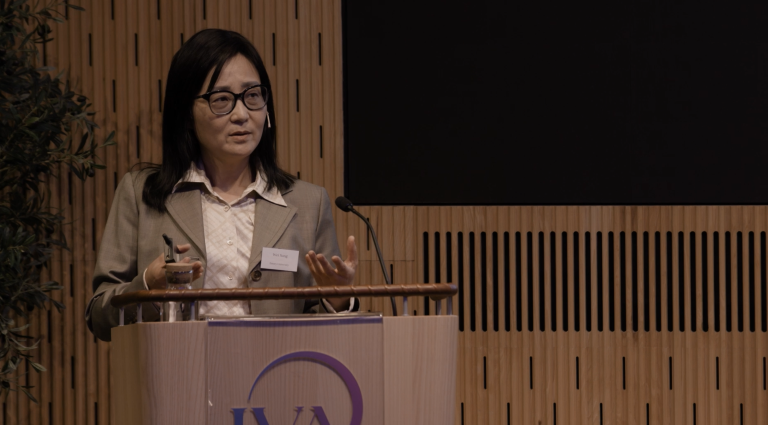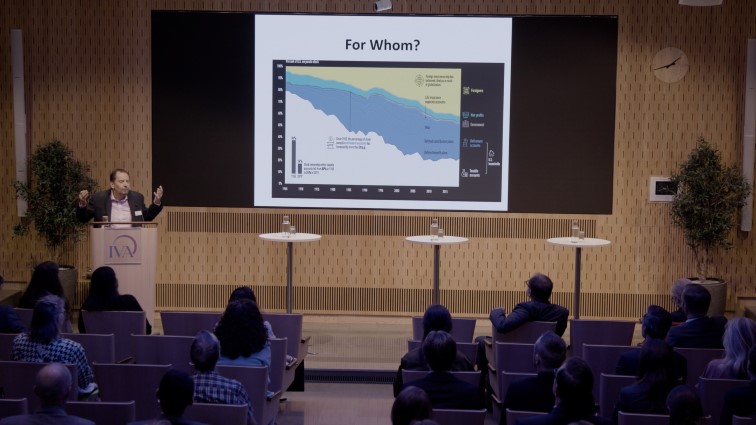A New Era in Corporate Governance: Diversity, Democracy, and Shareholder Power
aug. 28, 2024
Increasingly, businesses are being called upon not only to deliver financial returns but also to consider their broader impact on society, including political and environmental implications. This shift presents a challenge for traditional corporate governance models, particularly as global investors with limited direct engagement in companies complicate established practices.

At a recent conference hosted by the Swedish House of Finance and the European Corporate Governance Institute, experts gathered to discuss the future of corporate governance. Among the participants of the panel discussions were: Luigi Zingales (Chicago Booth), Wei Jiang (Emory University), and Petra Hedengran (Investor AB), Wilhelm Mohn (NBIM), Catharina Belfrage Sahlstrand (Handelsbanken), Ann Grevelius (Opti), and Mireia Gine (IESE Business School).
The speakers offered insights into how companies can navigate this complex landscape by rethinking both the composition of their boards and the role of shareholders in shaping corporate strategy.
Diverse View of Board Diversity
Wei Jiang discussed the multidimensional nature of board diversity, urging a move beyond the typical focus on demographic attributes like gender and race. Her study, which analyzed data from over 52,000 directors across more than 5,400 firms from 2000 to 2021, revealed that while demographic diversity has significantly improved, other critical dimensions—such as professional experience, educational background, and political viewpoints—remain underdeveloped.

Jiang emphasized the need to broaden the concept of diversity to include these varied dimensions. She noted that political diversity, in particular, is often overlooked, leading to boards that become more politically homogeneous even as they diversify demographically. For boards to fully benefit from diversity, Jiang argued, they must embrace a wide range of perspectives, including those shaped by different professional and institutional backgrounds.
“From an economic perspective, in a decision-making body, we want everyone to somehow draw independent signals,” Jiang explained. “By aggregating those independent signals, you can reach an informed decision that is also robust. If people come into the room with the same view and opinion, you might occasionally make a very correct decision, but that decision is unlikely to be robust given the dynamically changing landscape and society.”
Shareholder Welfare—Not Value—Maximization
Parallel to Jiang’s discussion on board diversity, Luigi Zingales pressed for a broader rethinking of corporate purpose. Presenting his research on "Corporate Democracy," Zingales challenged the traditional profit-maximization model, as articulated by Milton Friedman, arguing that it fails to consider the broader social impacts of corporate actions. Instead, he proposed a model of shareholder welfare maximization, where companies consider the societal and environmental implications of their decisions alongside financial performance.

Zingales highlighted the ethical dilemmas firms face, such as whether companies should lobby for policies that may harm society but benefit their bottom line. He questioned whether companies should act solely based on reputational risk or if they should consider moral implications, even if unethical actions could go unnoticed.
“You see the contradiction in full force, is, if we really had to maximize profits at the whole term, as a CEO, you have a duty to lobby,” Zingales said. “How do you solve this tension?”
In response, Petra Hedengran of Investor AB argued that the tension was oversimplified. She emphasized the importance of long-term shareholder value:
“That is very short-term thinking, a lot of shareholders and companies are actually working to create long term shareholder value. That means, yes, maximizing the value, but it's not equal to maximizing profits at the expense of other considerations. And I think that's a very the time horizon is really important here.”
“Investor Assemblies” as a Solution?
The two panel discussions converged on the idea that modern corporate governance must evolve to reflect the complexities of today’s business environment.
The concept of corporate democracy, as proposed by Zingales, complements the call for more comprehensive board diversity by suggesting mechanisms—like “investor assemblies”—to ensure that the diverse perspectives of shareholders are represented in corporate decision-making.
These investor assemblies, modeled after citizens' assemblies in political governance, would allow for a more representative sample of shareholders to influence corporate policies, potentially leading to decisions that better align with societal values. This approach addresses the challenge highlighted by Jiang: ensuring that diversity within corporate leadership translates into more effective and socially responsible governance.
